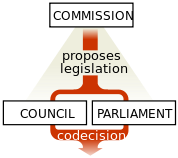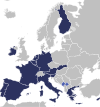Member of the European Parliament
A Member of the European Parliament (MEP) is the English name for a person who has been elected to the European Parliament,[1] one of the European Union's two legislative bodies. MEPs are the European Union's equivalents of a country's national legislators in either the lower house or unicameral parliaments, often known as MPs or Deputies. The name of MEPs differ in different languages, with terms such as europarliamentarian or eurodeputy being common in Romance language-speaking countries.
When the European Parliament was first established, MEPs were appointed by member states from members of their own national parliament. Since 1979, however, MEPs have been elected by direct universal suffrage. Each country establishes their own way of electing their MEPs and in some countries the electoral system has changed over time and across regions. All now use one or another form of proportional representation. For a list of the current members see Members of the European Parliament 2009–2014.
Election of MEPs
Since 1 January 2007 (when Romania and Bulgaria joined the EU), there had been 785 MEPs, but their number fell back to 736 at the latest elections in 2009, though this will eventually rise to 751, with each member state having at least six and at most 96. Elections occur once every five years, on the basis of universal adult suffrage. There is no uniform voting system for the election of MEPs; rather, each member state is free to choose its own system, subject to three restrictions:
- The system must be a form of proportional representation, under either the party list or Single Transferable Vote system.
- The electoral area may be subdivided if this will not generally affect the proportional nature of the voting system.
- Any election threshold on the national level must not exceed five percent.
The allocation of seats to each member state is based on the principle of degressive proportionality, so that, while the size of the population of each country is taken into account, smaller states elect more MEPs than would be strictly justified by their populations alone. As the number of MEPs granted to each country has arisen from treaty negotiations, there is no precise formula for the apportionment of seats among member states. No change in this configuration can occur without the unanimous consent of all governments.
The most recent elections to the European Parliament were the European elections of 2009, held in June of that year. They were the largest simultaneous transnational elections ever held anywhere in the world, since nearly 500 million citizens were eligible to vote.
Length of Service
The European Parliament has a high turnover of members compared to some national parliaments. For instance, after the 2004 elections, the majority of elected members had not been members in the prior parliamentary session, though that could largely be put down to the recent enlargement. Only one (Hans-Gert Pöttering) has served continuously since the first elections in 1979.
MEPs within the Parliament

Members of the seventh European Parliament:
European People's Party (265)
Progressive Alliance of Socialists and Democrats (184)
Alliance of Liberals and Democrats for Europe (84)
European Greens–European Free Alliance (55)
European Conservatives and Reformists (54)
European United Left–Nordic Green Left (35)
Europe of Freedom and Democracy (32)
Non-Inscrits (27)
All but 27 MEPs are members of cross-nationality political groups, organised according to political allegiance. For instance, the UK's Labour MEPs are members of the Party of European Socialists, and all Conservative MEPs were members of the European People's Party - European Democrats, until they left it to form a new group (the European Conservatives and Reformists Group) in July 2009.
Group discipline is laxer than most national parliaments, with national delegations and individual members sometimes voting against the Group 'line' on particular issues. Furthermore, the position taken by a Group on any given issue is determined by discussion within the Group, not handed down by the party leadership. Individual 'back-bench' MEPs do therefore have considerable influence over the development of policy within the Parliament.
Aside from working through their Groups, individual members are also guaranteed a number of individual powers and rights within the Parliament:
- the right to table a motion for resolution;
- the right to put questions to the Council of Ministers, the Commission, and to the leaders of the Parliament;
- the right to table an amendment to any text in committee;
- the right to make explanations of vote;
- the right to raise points of order;
- the right to move the inadmissibility of a matter.
The job of an MEP
Every month except August the Parliament meets in Strasbourg for a four-day plenary session, six times a year it meets for two days each in Brussels[2], where the Parliament's committees also mainly meet.[3] The obligation to spend one week a month in Strasbourg was imposed on Parliament by the Member State governments at the Edinburgh summit in 1992.
In addition an MEP may be part of an international delegation and have meetings with outside delegations coming to Brussels or Strasbourg or visiting committees or parliaments of external countries or regions. There are also a number of international parliaments that members participate in such as the ACP-EU Joint Parliamentary Assembly, the Euro-Mediterranean Parliamentary Assembly, the Euro-Latin American Parliamentary Assembly and lately, the Euromed Parliamentary Assembly. This work entails full annual parliamentary meetings and more frequent multilateral committee meetings. Members also make up a portion of European Election Observation missions.
Also there is the need to keep in touch with constituents in the home country. Most MEPs return to their constituencies on a Thursday evening to spend the Friday and often weekends dealing with individual constituents, local organisations, local and national politicians, businesses, trade unions, local councils and so on. Four weeks without parliamentary meetings set aside during the year and the parliamentary recess (four weeks in summer, two at Christmas/New Year) can also be used for constituency duties.
MEPs may employ staff to help them, typically three or four split between their constituency office and office in Parliament.
Because MEPs sit in a parliament with powers over fewer subjects than national parliaments, their public profile in their home country is typically lower than that of national parliamentarians, at least those of the latter who are ministers or opposition spokesmen.
Some MEPs choose to make their family home in or near Brussels rather than in their home country.
Powers
Since the ratification and entry into force of the Lisbon Treaty the adoption of nearly all EU legislation requires the approval of both the European Parliament and the Council of Ministers. Under the co-decision procedure, they each have up to three readings of legislative proposals put forward by the European Commission in which they can each amend the proposal, but must ultimately approve a text in identical terms for it to be passed. This amounts to bicameralism.
MEPs also elect the President of the Commission, on the basis of a proposal by the European Council and, following public hearings of the candidates, approve the appointment of the Commission as a whole. The Parliament may also dismiss the Commission in a vote of no-confidence (for instance, in 1999, the Commission presided by Jacques Santer resigned when faced with the certain adoption of such a vote of no confidence). MEPs may table parliamentary questions for Question time or for a written answer.
International agreements entered into by the European Union (e.g. WTO, some trade agreements, etc.) must be approved by the European Parliament, as must the accession of new Member States to the Union.
The EU's annual budget is adopted by Parliament, within ceilings for expenditure of different categories laid down jointly by Parliament and the Council of Ministers, and respecting the overall limit on EU spending decided on by unanimous agreement of all Member States.
The Parliament also elects the European Ombudsman and holds hearings with candidates for the President and Board members of European Central Bank,the Court of Auditors and various EU agencies.
Payment and Privileges
Salary
Until 2009, MEPs were paid (by their own Member State) exactly the same salary as a member of the lower House of their own national parliament. As a result, there was a wide range of salaries in the European Parliament. In 2002, Italian MEPs earned €130,000, while Spanish MEPs earned barely a quarter of that at €32,000.[4]
However, in July 2005 the Council agreed to a single statute for all MEPs, following a proposal by the Parliament. Thus, from the first day of the parliamentary term starting in 2009, all MEPs receive a basic yearly salary of 38.5% of a European Court judge's salary - being around €84,000. This represents a pay-cut for MEPs from some countries (e.g. Italy, Germany, and Austria), a rise for others (particularly the low-paid Eastern European Members) and status quo for those from the United Kingdom (depending on the euro-pound exchange rate). The much-criticised expenses arrangements will also be reformed.[5]
Expenses and recent reforms
Before the 2009 reforms, commentators in several member states (most notably Denmark, Sweden and the UK) accused MEPs of taking advantage of generous expense allowances for personal profit. These criticisms typically centred on two areas:
- the amount paid to MEPs as expenses; and
- the manner in which it is paid.
With regard to the amount paid, these are roughly equivalent to those paid to British MPs. As of 2002:
- British MPs received an allowance for travel around their constituencies, but MEPs did not, despite the fact that their constituencies were much larger.
- British MPs were paid a lump sum of just under £19,500 for accommodation at seat of Parliament, regardless of the time they actually spent there. MEPs received £150 per day attended and were required to sign in to prove attendance.
- Both British MPs and MEPs were paid travel expenses for journeys from constituencies to Parliament. Contrary to widespread rumours, MEPs received 'YY economy class' air fares paid, not first class, plus an allowance per kilometre for the trip from their home to the airport. Only one journey was allowed per week.
- British MPs were given first class rail tickets for spouse and children to Westminster up to thirty times per year. MEPs had no such allowance.
- British MPs were given two return tickets per year to any EU parliament or the European Parliament itself. MEPs had no such allowance.
- British MPs received unlimited travel expenses around the UK on parliamentary business. MEPs were given a similar allowance, but this was limited to £2,170 per year, plus an extra allowance if they needed to return home midweek.
- British MPs and MEPs both received an office allowance. MEPs were paid 44% more than MPs, but this had to include postage and all equipment, whereas MPs also received unlimited free postage and free computers.
- British MPs and MEPs both had a staff allowance. MEPs received 30% more than MPs, but their staffs are typically larger, and this amount had to cover staff pensions, temporary replacements for illness, redundancy costs at end of mandate, staff travel, insurance, administration, and employer's liability. MPs had those provided for free on top of their allowance.
- At the end of their mandates, British MPs received four months of office allowances, while MEPs received three.
- At the end of their mandates, MEPs get a silver medal, and during their mandate their train travels (TGV and Eurostar excluded) in Belgium are free.
With regard to the manner in which it is paid, complaints are often raised about the fact that MEPs' flights to and from Brussels were paid at a flat rate, regardless of the expenditure actually incurred. The price paid is for economy travel, not first-class , but nevertheless this value could amount to more than the actual price of travel, even if there are no "budget" airlines serving Brussels. This too changed with the new Parliament elected in 2009, with only the cost actually incurred and documented reimbursed.
Another area of concern is the fact that MEPs' accounts are currently audited on a spot-check basis, not a universal one. Feeling this to be insufficient, some members voluntarily submit their accounts for a full independent audit annually. All UK Labour MEPs have done so since 2000, the Conservatives and Liberal Democrats since 2008.
Financial interests
Members declare their financial interests, which are published annually in a register and available on the Internet.
Immunities
Under the protocol on the privileges and immunities of the European Union, MEPs in their home country receive the same immunities as their own national parliamentarians. In other member states, MEPs are immune from detention and from legal proceedings, except when caught in the act of committing an offence. This immunity may be waived by application to the European Parliament by the authorities of the country in question.
Individual members
Members' experience
Around a third of MEPs have previously held national parliamentary mandates, and over 10% have ministerial experience at a national level. Among the 177 MEPs with such experience elected in 1999 were six prime ministers and three former members of the European Commission. Many other MEPs have held office at a regional or local level in their home countries.
Current MEPs also include former judges, trade union leaders, media personalities, actors, soldiers, singers, athletes, and political activists.
Many outgoing MEPs move into other political office. A remarkably high proportion of European countries' recent heads of government have previously served in the Parliament.
Dual mandates
The so-called "dual mandate"—in which an individual is a member of both his or her national parliament and the European Parliament, was officially discouraged by a growing number of political parties and Member States, and is prohibited as of 2009. In the 2004-2009 Parliament, a small number of members still held a dual mandate, such as MEPs Baroness Ludford and Baroness Nicholson of Winterbourne (both UK Liberal Democrats who also sat in the House of Lords). Notably, Ian Paisley and John Hume once held "triple mandates" as MEP, MP in the House of Commons, and MLA in the Northern Ireland Assembly simultaneously.
Diversity
The proportion of MEPs elected in 2004 who were female was 30.2 percent (in 1979 it was just 16.5 percent), a higher percentage than most national parliaments. This figure varies considerably among the various national delegations, however. Of UK members, for instance, approaching half of the Labour MEPs are female, compared to only one Conservative member. The figure for the Parliament elected in 2009 is 35 percent.
The oldest member is Giovanni Berlinguer, born in 1924; the former communist was present at the signing of the Treaty of Rome in 1957. The youngest is Amelia Andersdotter, born in 1987, who joined the parliament in 2009.
There are invariably numerous figures in the Parliament who are already well known for a wide variety of other reasons. For example, in the 2004-2009 Parliament:
- Vladimír Remek, the first man in space not from the United States or the Soviet Union.
- Jean-Marie Le Pen, far-right French politician, came second in the 2002 French presidential election.
- Michel Rocard, former Prime Minister of France (1988-1991).
- Alessandra Mussolini, granddaughter of Italian fascist World War II dictator Benito Mussolini.
- Michael Cashman, former British actor (EastEnders) and gay rights campaigner.
- Peter Šťastný, Slovak professional ice hockey player.
- Giovanni Rivera, a former Italian football player and European Footballer of the Year in 1969.
- László Tőkés, an ethnic Hungarian pastor in Romania who played an important role in the Romanian Revolution of 1989.
- Daniel Cohn-Bendit, 1968 French student leader
- Krzysztof Hołowczyc, Polish Rally driver
- Jean-Luc Dehaene, former Prime Minister of Belgium
- Vytautas Landsbergis, former leader of the independence movement and President of Lithuania
- Poul Nyrup Rasmussen, former Prime Minister of Denmark
- Jerzy Buzek, former Prime Minister of Poland
- Guntars Krasts, former Prime Minister of Latvia
- Alojz Peterle, former Prime Minister of Slovenia
- Anneli Jäätteenmäki, former Prime Minister of Finland
- Philippe Morillon, former Commander of UNPROFOR peace keeping force in Bosnia
- Theodor Stolojan, former Prime Minister of Romania
Notable former members:
- Maurice Duverger, French political scientist
- Otto von Habsburg, former head of the Habsburg dynasty
- Reinhold Messner, a renowned Italian mountaineer and explorer from South Tyrol
- Ian Paisley, leading politician of Northern Ireland, a member from 1979 to 2004 with a "triple mandate" as MEP, MP, and MLA
- John Hume, another leading Northern Irish politician and Nobel Peace Prize laureate, similarly having held a "triple mandate"
- Jacques Delors, later President of the Commission
- Massimo D'Alema, former Prime Minister of Italy
- Dana Rosemary Scallon, 1970 Eurovision Song Contest winner
- Lilli Gruber, high-profile television journalist who joined politics to oppose Silvio Berlusconi's high degree of media control
- Willy Brandt, former German Chancellor
- John Prescott, later Deputy Prime Minister of the UK
- Geoff Hoon, later Transport Secretary (and former Defence Secretary during Iraq war) of the UK
- Gijs de Vries, former European Anti-Terrorism Coordinator
- Valéry Giscard d'Estaing, former President of France
- Jacques Chirac, later President of France
- François Mitterrand, later President of France
- Giulio Andreotti, former Prime Minister of Italy
- Silvio Berlusconi, later Prime Minister of Italy
- Giorgio Napolitano, later President of Italy
- Mário Soares, former Prime Minister and President of Portugal
- Wilfried Martens and Leo Tindemans, former Prime Ministers of Belgium
- Emilio Colombo, former Prime Minister of Italy
- Laurent Fabius, former Prime Minister of France
- Toomas Hendrik Ilves, later President of Estonia
- Anna Palacio, later Foreign Minister of Spain
- Nick Clegg, later leader of the UK Liberal Democrats and Deputy Prime Minister of the UK
- Joseph Muscat, later leader of the Malta Labour Party
- Ari Vatanen, Champion Rally driver, elected to second term by a French constituency, rather than his native Finland. In 2009 elections was again candidate in Finland, but did not win a seat.
- Robert Kilroy-Silk, former chat show host maverick who was fired from the BBC.
Convicted MEPs
As the Act of 20 September 1976 concerning the election of the Members of the European Parliament by direct universal suffrage doesn't still regulate the matter, today there are many Members of the European Parliaments who were convicted, also for serious crimes like corruption charges, illegal financial practices or discrimination. MEPs with criminal records are for example: Vito Bonsignore and Aldo Patriciello (European people's party, EPP) and Mario Borghezio (EFD).
Election of non-nationals
European citizens are eligible for election in the member state where they reside (subject to the residence requirements of that country); they do not have to be a national of that state. The following citizens have been elected in a state other than their native country;[6]
| Name |
Year (first
election) |
Nationality |
State of
election |
Party |
| Christine Crawley |
1984 |
Irish |
UK |
Socialist |
| Bárbara Dührkop Dührkop |
1987 |
German |
Spain |
Socialist |
| Anita Pollack |
1989 |
Australian |
UK |
Socialist |
| Maurice Duverger |
1989 |
French |
Italy |
GUE |
| Wilmya Zimmermann |
1994 |
Dutch |
Germany |
Socialist |
| Oliver Dupuis |
1994 |
Belgian |
Italy |
Radical |
| Daniel Cohn-Bendit |
1999 |
German |
France |
Green |
| Monica Frassoni |
1999 |
Italian |
Belgium |
Green |
| Frédérique Ries |
2001 |
French |
Spain |
Liberal |
| Willem Schuth |
2004 |
Dutch |
Germany |
Liberal |
| Daniel Stroz |
2004 |
German |
Czech Republic |
GUE |
| Ari Vatanen |
2004 |
Finnish |
France |
EPP |
- 2009 figures missing
Observers
It is conventional for countries acceding to the European Union to send a number of observers to Parliament in advance. The number of observers and their method of appointment (usually by national parliaments) is laid down in the joining countries' Treaties of Accession.
Observers may attend debates and take part by invitation, but they may not vote or exercise other official duties. When the countries then become full member states, these observers become full MEPs for the interim period between accession and the next European elections. From 26 September 2005 to 31 December 2006, Bulgaria had 18 observers in Parliament and Romania 35. These were selected from government and opposition parties as agreed by the countries' national parliaments. Following accession on 1 January 2007, the observers became MEPs (with some personnel changes).
See also
- Category:Members of the European Parliament
- The European Parliament (seventh edition, 2007), by Richard Corbett, Francis Jacobs and Michael Shackleton.
References
External links
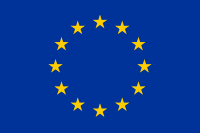 Members of the European Parliament Members of the European Parliament |
|
| 1952–1958 |
Belgium · France · Italy · Luxembourg · Netherlands · West Germany
|
|
| 1958–1979 |
Belgium · Denmark (1973) · France · Ireland (1973), (1973–77), (1977–79) · Italy · Luxembourg · Netherlands · United Kingdom (1973) · West Germany
|
|
| 1979–1984 |
Belgium · Denmark · France · Greece (1981) · Ireland · Italy · Luxembourg · Netherlands · United Kingdom · West Germany
|
|
| 1984–1989 |
Belgium · Denmark · France · Greece · Ireland · Italy · Luxembourg · Netherlands · Portugal (1987) · Spain (1987) · United Kingdom · West Germany
|
|
| 1989–1994 |
Belgium · Denmark · France · Greece · Ireland · Italy · Luxembourg · Netherlands · Portugal · Spain · United Kingdom · West Germany
|
|
| 1994–1999 |
Austria (1996) · Belgium · Denmark · Finland (1996) · France · Germany · Greece · Ireland · Italy · Luxembourg · Netherlands · Portugal · Spain · Sweden (1995) · United Kingdom
|
|
| 1999–2004 |
Austria · Belgium · Denmark · Finland · France · Germany · Greece · Ireland · Italy · Luxembourg · Netherlands · Portugal · Spain · Sweden · United Kingdom
|
|
| 2004–2009 |
Austria · Belgium · Bulgaria (2007) · Cyprus · Czech Republic · Denmark · Estonia · Finland · France · Germany · Greece · Hungary · Ireland · Italy · Latvia · Lithuania · Luxembourg · Malta · Netherlands · Poland · Portugal · Romania (2007) · Slovakia · Slovenia · Spain · Sweden · United Kingdom (including Gibraltar)
|
|
| 2009–2014 |
Austria · Belgium · Bulgaria · Cyprus · Czech Republic · Denmark · Estonia · Finland · France · Germany · Greece · Hungary · Ireland · Italy · Latvia · Lithuania · Luxembourg · Malta · Netherlands · Poland · Portugal · Romania · Slovakia · Slovenia · Spain · Sweden · United Kingdom (including Gibraltar)
|
|
| Delegations |
Sweden (1995) · Poland (2004) · Bulgaria (2007) · Romania (2007)
|
|
 Topics on the European Parliament Topics on the European Parliament |
|
| Organisation |
Bureau · Committees and Delegations · Conference · MEPs · President ( Jerzy Buzek) ·
Quaestor · Rapporteur · Secretariat · Vice Presidents |
 |
|
| Politics |
COSAC (National parliaments) · Groups · Parties · Reform working group
|
|
| Elections |
1979 · 1984 · 1989 · 1994 · 1999 · 2004 (session / members) · 2009 (session / members) · Apportionment · Constituencies |
|
| Intergroups |
Crocodile Club · Spinelli Group
|
|
| Locations |
Strasbourg (Buildings) · Brussels (Buildings · Esplanade) · Luxembourg buildings
|
|
| History |
|
|
| Other |
Europa InSitu · EuroparlTV · Lux Prize · Model European Communities Project · Sakharov Prize
|
|
| European Union Portal · Brussels Portal |
|
|
previous ← Members of the European Parliament 2004–2009 → following |
|
|
Austria MEPs 2004–2009 |
|
|
Maria Berger · Herbert Bösch · Harald Ettl · Othmar Karas · Jörg Leichtfried · Eva Lichtenberger · Hans-Peter Martin · Andreas Mölzer · Christa Prets · Reinhard Rack · Karin Resetarits · Paul Rübig · Karin Scheele · Agnes Schierhuber · Richard Seeber · Ursula Stenzel · Hannes Swoboda · Johannes Voggenhuber
|

 |
|
|
|
|
Belgium MEPs 2004–2009 |
|
|
Dutch electoral college
|
Ivo Belet · Frieda Brepoels (replacing Geert Bourgeois) · Philip Claeys · Jean-Luc Dehaene · Mia De Vits · Koenraad Dillen (replacing Filip Dewinter) · Saïd el Khadraoui · Annemie Neyts-Uyttebroeck · Bart Staes · Dirk Sterckx (replacing Guy Verhofstadt) · Marianne Thyssen · Frank Vanhecke · Johan Van Hecke (replacing Karel De Gucht) · Anne Van Lancker |

 |
|
|
French electoral college
|
Philippe Busquin (replacing Elio Di Rupo) · Véronique de Keyser · Gérard Deprez · Antoine Duquesne (replacing Louis Michel) · Alain Hutchinson · Pierre Jonckheer · Raymond Langendries (replacing Joëlle Milquet) · Frédérique Ries · Marc Tarabella (replacing Michel Daerden)
|
|
|
German electoral college
|
Mathieu Grosch
|
|
|
|
|
Bulgaria MEPs 2007–2009 |
|
|
Mariela Baeva · Slavcho Binev · Desislav Chukolov · Filiz Husmenova · Rumiana Jeleva · Metin Kazak · Evgeni Kirilov · Marusya Lyubcheva · Nikolay Mladenov · Vladko Panayotov · Atanas Paparizov · Biliana Raeva · Petya Stavreva · Dimitar Stoyanov · Vladimir Uruchev · Kristian Vigenin · Iliana Yotova · Dushana Zdravkova
|
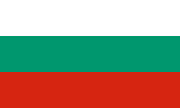
 |
|
|
|
|
Cyprus MEPs 2004–2009 |
|
|
Adamos Adamou · Panayiotis Demetriou · Ioannis Kasoulides · Marios Matsakis · Yiannakis Matsis · Kyriacos Triantaphyllides
|

 |
|
|
|
|
Czech Republic MEPs 2004–2009 |
|
|
Jana Bobošíková · Jan Březina · Milan Cabrnoch · Petr Duchoň · Hynek Fajmon · Richard Falbr · Věra Flasarová · Jana Hybášková · Jaromír Kohlíček · Jiří Maštálka · Miroslav Ouzký · Miloslav Ransdorf · Vladimír Remek · Zuzana Roithová · Libor Rouček · Nina Škottová · Ivo Strejček · Daniel Stroz · Oldřich Vlasák · Jan Zahradil · Tomáš Zatloukal · Vladimír Železný · Jozef Zieleniec · Jaroslav Zvěřina
|

 |
|
|
|
|
Denmark MEPs 2004–2009 |
|
Margrete Auken · Hanne Dahl · Niels Busk · Mogens Camre · Ole Christensen · Anne Elisabet Jensen · Dan Jørgensen · Søren Søndergaard · Christel Schaldemose · Poul Nyrup Rasmussen · Karin Riis-Jørgensen · Johannes Lebech · Gitte Seeberg · Britta Thomsen |

 |
|
|
|
|
Estonia MEPs 2004–2009 |
|
Toomas Hendrik Ilves (replaced by Katrin Saks) · Tunne Kelam · Marianne Mikko · Siiri Oviir · Toomas Savi · Andres Tarand
|

 |
|
|
|
|
Finland MEPs 2004–2009 |
|
|
Satu Hassi · Ville Itälä · Anneli Jäätteenmäki · Piia-Noora Kauppi · Eija-Riitta Korhola · Henrik Lax · Lasse Lehtinen · Riitta Myller · Reino Paasilinna · Sirpa Pietikäinen · Esko Seppänen · Hannu Takkula · Paavo Väyrynen · Kyösti Virrankoski
|

 |
|
|
|
|
France MEPs 2004–2009 |
|
|
East France
|
Jean Marie Beaupuy · Catherine Boursier · Bruno Gollnisch · Natalie Griesbeck · Benoît Hamon · Marie-Anne Isler-Béguin · Véronique Mathieu · Pierre Pribetich · Catherine Trautmann
|

 |
|
|
Île-de-France
|
Pervenche Berès · Paul-Marie Coûteaux · Harlem Désir · Anne Ferreira · Nicole Fontaine · Patrick Gaubert · Marine Le Pen · Bernard Lehideux · Alain Lipietz · Marielle de Sarnez · Gilles Savary · Pierre Schapira · Jacques Toubon · Francis Wurtz
|
|
|
Massif Central-Centre
|
Jean-Pierre Audy · Jean-Paul Denanot · Marie-Hélène Descamps · Janelly Fourtou · Catherine Guy-Quint · Brice Hortefeux · André Laignel
|
|
|
North-West France
|
Jean-Louis Cottigny · Brigitte Douay · Hélène Flautre · Brigitte Fouré · Jean-Paul Gauzès · Jacky Henin · Carl Lang · Fernand Le Rachinel · Marie-Noëlle Lienemann · Vincent Peillon · Tokia Saïfi
|
|
|
Overseas Territories
|
Catherine Néris · Margie Sudre · Paul Verges
|
|
|
South-East France
|
Jean-Luc Bennahmias · Guy Bono · Marie-Arlette Carlotti · Thierry Cornillet · Claire Gibault · Françoise Grossetête · Jean-Marie Le Pen · Patrick Louis · Michel Rocard · Martine Roure · Lydia Schenardi · Ari Vatanen · Dominique Vlasto |
|
|
South-West France
|
Kader Arif · Françoise Castex · Jean-Marie Cavada · Alain Lamassoure · Anne Laperrouze · Jean-Claude Martinez · Gérard Onesta · Béatrice Patrie · Christine de Veyrac · Michel Teychenné
|
|
|
West France
|
Marie-Hélène Aubert · Ambroise Guellec · Stéphane Le Foll · Roselyne Lefrançois · Philippe Morillon · Élisabeth Morin-Chartier · Yannick Vaugrenard · Bernadette Vergnaud · Philippe de Villiers
|
|
|
|
|
Germany MEPs 2004–2009 |
|
Alexander Nuno Alvaro · Angelika Beer · Rolf Berend · Reimer Böge · Hiltrud Breyer · André Brie · Elmar Brok · Udo Bullmann · Daniel Caspary · Jorgo Chatzimarkakis · Daniel Cohn-Bendit · Michael Cramer · Albert Dess · Garrelt Duin · Christian Ehler · Markus Ferber · Karl-Heinz Florenz · Ingo Friedrich · Michael Gahler · Evelyne Gebhardt · Norbert Glante · Lutz Goepel · Alfred Gomolka · Friedrich-Wilhelm Graefe zu Baringdorf · Ingeborg Grässle · Lissy Gröner · Matthias Groote · Klaus Hänsch · Rebecca Harms · Jutta Haug · Ruth Hieronymi · Karsten Friedrich Hoppenstedt · Milan Horáček · Georg Jarzembowski · Elisabeth Jeggle · Karin Jöns · Gisela Kallenbach · Sylvia-Yvonne Kaufmann · Heinz Kindermann · Ewa Klamt · Christa Klaß · Wolf Klinz · Dieter-Lebrecht Koch · Silvana Koch-Mehrin · Christoph Werner Konrad · Holger Krahmer · Konstanze Krehl · Wolfgang Kreissl-Doerfler · Helmut Kuhne · Alexander Graf Lambsdorff · Werner Langen · Armin Laschet · Kurt Joachim Lauk · Kurt Lechner · Klaus-Heiner Lehne · Jo Leinen · Peter Liese · Erika Mann · Thomas Mann · Helmuth Markov · Hans-Peter Mayer · Hartmut Nassauer · Angelika Niebler · Vural Öger · Cem Özdemir · Doris Pack · Tobias Pflüger · Willi Piecyk · Markus Pieper · Hans-Gert Poettering · Bernd Posselt · Godelieve Quisthoudt-Rowohl · Alexander Radwan · Bernhard Rapkay · Herbert Reul · Dagmar Roth-Behrendt · Mechtild Rothe · Heide Rühle · Frithjof Schmidt · Ingo Schmitt · Horst Schnellhardt · Juergen Schröder · Elisabeth Schroedter · Martin Schulz · Willem Schuth · Andreas Schwab · Renate Sommer · Ulrich Stockmann · Helga Trüpel · Feleknas Uca · Thomas Ulmer · Karl von Wogau · Sahra Wagenknecht · Ralf Walter · Manfred Weber · Barbara Weiler · Anja Weisgerber · Reiner Wieland · Joachim Wuermeling · Gabi Zimmer |
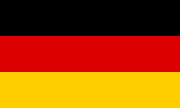
 |
|
|
|
|
Greece MEPs 2004–2009 |
|
|
Stavros Arnaoutakis · Katerina Batzeli · Panagiotis Beglitis · Giorgos Dimitrakopoulos · Georgios Karatzaferis (replaced by Georgios Georgiou) · Ioannis Gklavakis · Konstantinos Hatzidakis · Rodi Kratsa-Tsagaropoulou · Stavros Lambrinidis · Diamanto Manolakou · Maria Matsouka · Manolis Mavrommatis · Thanasis Pafilis · Marie Panayotopoulos-Cassiotou · Dimitrios Papadimoulis · Georgios Papastamkos · Antonis Samaras · Nikolaos Sifounakis · Giorgos Toussas · Antonios Trakatellis · Evangelia Tzampazi · Nikos Vakalis · Ioannis Varvitsiotis · Marilisa Xenogiannakopoulou
|

 |
|
|
|
|
Hungary MEPs 2004–2009 |
|
|
Etelka Barsiné Pataky · Zsolt László Becsey · Antonio De Blasio · Alexandra Dobolyi · Szabolcs Fazakas · Kinga Gál · Béla Glattfelder · Zita Gurmai · András Gyürk · Gábor Harangozó · Gyula Hegyi · Edit Herczog · Lívia Járóka · Magda Kósáné Kovács · Katalin Lévai · Viktória Mohácsi · Péter Olajos · Csaba Őry · Pál Schmitt · György Schöpflin · László Surján · József Szájer · István Szent-Iványi · Csaba Sándor Tabajdi
|

 |
|
|
|
|
Ireland MEPs 2004–2009 |
|
|
Dublin
|
Proinsias De Rossa · Mary Lou McDonald · Gay Mitchell · Eoin Ryan
|

 |
|
|
East
|
Liam Aylward · Avril Doyle · Mairead McGuinness
|
|
|
North-West
|
Marian Harkin · Jim Higgins · Seán Ó Neachtain
|
|
|
South
|
Simon Coveney (replaced by Colm Burke) · Brian Crowley · Kathy Sinnott
|
|
|
|
|
Italy MEPs 2004–2009 |
|
|
Central
|
Roberta Angelilli · Alfredo Antoniozzi · Alessandro Battilocchio · Carlo Casini · Alessandro Foglietta · Lilli Gruber · Umberto Guidoni · Luisa Morgantini · Alessandra Mussolini · Pasqualina Napoletano · Lapo Pistelli · Guido Sacconi · Luciana Sbarbati · Antonio Tajani · Stefano Zappalà · Nicola Zingaretti |

 |
|
|
Islands
|
Giuseppe Castiglione · Giusto Catania · Luigi Cocilovo · Claudio Fava · Raffaele Lombardo · Nello Musumeci · Francesco Musotto
|
|
|
North East
|
Sergio Berlato · Giovanni Berlinguer · Umberto Bossi · Iles Braghetto · Renato Brunetta · Marco Cappato · Giorgio Carollo · Paolo Costa · Michl Ebner · Gian Paolo Gobbo · Donata Gottardi · Sepp Kusstatscher · Roberto Musacchio · Vittorio Prodi · Amalia Sartori · Mauro Zani |
|
|
North West
|
Vittorio Agnoletto · Gabriele Albertini · Vito Bonsignore · Mario Borghezio · Giulietto Chiesa · Carlo Fatuzzo · Francesco Ferrari · Monica Frassoni · Jas Gawronski · Romano Maria la Russa · Pia Elda Locatelli · Mario Mantovani · Mario Mauro · Cristiana Muscardini · Marco Pannella · Pier Antonio Panzeri · Guido Podestà · Marco Rizzo · Giovanni Rivera · Francesco Speroni · Gianluca Susta · Patrizia Toia |
|
|
Southern
|
Vincenzo Aita · Alfonso Andria · Gianni De Michelis · Giuseppe Gargani · Vincenzo Lavarra · Andrea Losco · Achille Occhetto · Aldo Patriciello · Umberto Pirilli · Giovanni Pittella · Adriana Poli Bortone · Luca Romagnoli · Salvatore Tatarella · Riccardo Ventre · Armando Veneto · Donato Tommaso Veraldi · Marcello Vernola
|
|
|
|
|
Latvia MEPs 2004–2009 |
|
Georgs Andrejevs · Valdis Dombrovskis · Guntars Krasts · Ģirts Valdis Kristovskis · Aldis Kušķis · Rihards Pīks · Inese Vaidere · Tatjana Ždanoka · Roberts Zīle |

 |
|
|
|
|
Lithuania MEPs 2004–2009 |
|
Laima Liucija Andrikienė · Šarūnas Birutis · Danutė Budreikaitė · Arūnas Degutis · Jolanta Dičkutė · Gintaras Didžiokas · Eugenijus Gentvilas · Ona Juknevičienė · Vytautas Landsbergis · Justas Vincas Paleckis · Rolandas Pavilionis · Aloyzas Sakalas · Margarita Starkevičiūtė |

 |
|
|
|
|
Luxembourg MEPs 2004–2009 |
|
|
Robert Goebbels · Erna Hennicot-Schoepges · Astrid Lulling · Lydie Polfer · Jean Spautz · Claude Turmes
|

 |
|
|
|
|
Malta MEPs 2004–2009 |
|
|
John Attard Montalto · Glenn Bedingfield · Simon Busuttil · David Casa · Louis Grech · Joseph Muscat
|

 |
|
|
|
|
Netherlands MEPs 2004–2009 |
|
|
Bert Doorn · Camiel Eurlings · Esther de Lange · Albert-Jan Maat · Maria Martens · Lambert van Nistelrooij · Ria Oomen-Ruijten · Joop Post · Cornelis Visser · Corien Wortmann-Kool · Max van den Berg · Thijs Berman · Emine Bozkurt · Ieke van den Burg · Jan Cremers · Dorette Corbey · Lily Jacobs · Edith Mastenbroek · Jan-Marinus Wiersma · Jeanine Hennis-Plasschaert · Jules Maaten · Toine Manders · Jan Mulder · Kathalijne Buitenweg · Joost Lagendijk · Paul van Buitenen · Els de Groen · Kartika Liotard · Erik Meijer · Johannes Blokland · Bastiaan Belder · Sophie in 't Veld
|
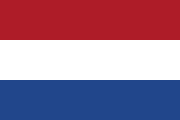
 |
|
|
|
|
Poland MEPs 2004–2009 |
|
Filip Adwent · Adam Bielan · Jerzy Buzek · Zdzisław Chmielewski · Sylwester Chruszcz · Marek Czarnecki · Ryszard Czarnecki · Hanna Foltyn-Kubicka · Bronisław Geremek · Lidia Geringer de Oedenberg · Adam Gierek · Maciej Giertych · Bogdan Golik · Genowefa Grabowska · Dariusz Grabowski · Małgorzata Handzlik · Stanisław Jałowiecki · Mieczysław Janowski · Filip Kaczmarek · Michał Kamiński · Bogdan Klich · Urszula Krupa · Wiesław Kuc · Barbara Kudrycka · Jan Kułakowski · Zbigniew Kuźmiuk · Janusz Lewandowski · Bogusław Liberadzki · Marcin Libicki · Jan Masiel · Jan Olbrycht · Janusz Onyszkiewicz · Bogdan Pęk · Józef Pinior · Mirosław Piotrowski · Paweł Piskorski · Zdzisław Podkański · Jacek Protasiewicz · Bogusław Rogalski · Dariusz Rosati · Wojciech Roszkowski · Leopold Rutowicz · Jacek Saryusz-Wolski · Czesław Siekierski · Marek Siwiec · Bogusław Sonik · Grażyna Staniszewska · Andrzej Szejna · Konrad Szymański · Witold Tomczak · Janusz Wojciechowski · Bernard Piotr Wojciechowski · Zbigniew Zaleski · Andrzej Tomasz Zapałowski · Tadeusz Zwiefka |

 |
|
|
|
|
Portugal MEPs 2004–2009 |
|
|
Francisco Assis · Luis Manuel Capoulas Santos · Paulo Casaca · Carlos Coelho · Fausto Correia · Manuel António dos Santos · Maria da Assunção Esteves · Edite Estrela · Emanuel Jardim Fernandes · Elisa Ferreira · Ilda Figueiredo · Duarte Freitas · Ana Maria Gomes · Vasco Graça Moura · Pedro Guerreiro · Jamila Madeira · Sérgio Marques · João de Deus Pinheiro · Miguel Portas · Luís Queiró · José Ribeiro e Castro · José Albino Silva Peneda · Sérgio Sousa Pinto
|

 |
|
|
|
|
Romania MEPs 2007–2009 |
|
|
Roberta Alma Anastase · Sebastian Valentin Bodu · Victor Boştinaru · Nicodim Bulzesc · Cristian Buşoi · Titus Corlăţean · Corina Creţu · Gabriela Creţu · Csaba Sógor · Magor Csibi · Dragoş Florin David · Daniel Dăianu · Constantin Dumitru · Sorin Frunzăverde · Petru Filip · Monica Maria Iacob Ridzi · Marian-Jean Marinescu · Ramona Mănescu · Cătălin Ioan Nechifor · Rareş Lucian Niculescu · Dumitru Oprea · Ioan Mircea Paşcu · Maria Petre · Rovana Plumb · Mihaela Popa · Nicolae-Vlad Popa · Daciana Octavia Sârbu · Adrian Severin · Theodor Stolojan · László Tőkés · Silvia Adriana Ţicău · Adina Ioana Vălean · Renate Weber · Iuliu Winkler · Marian Zlotea
|

 |
|
|
|
|
Slovakia MEPs 2004–2009 |
|
|
Peter Baco · Edit Bauer · Irena Belohorská · Monika Beňová · Árpád Duka-Zólyomi · Milan Gaľa · Ján Hudacký · Miloš Koterec · Sergej Kozlík · Vladimír Maňka · Miroslav Mikolášik · Zita Pleštinská · Peter Šťastný · Anna Záborská
|

 |
|
|
|
|
Slovenia MEPs 2004–2009 |
|
|
Mihael Brejc · Mojca Drčar Murko · Romana Jordan Cizelj · Jelko Kacin · Ljudmila Novak · Borut Pahor (replaced by Aurelio Juri) · Lojze Peterle
|

 |
|
|
|
|
Spain MEPs 2004–2009 |
|
|
Inés Ayala Sender · María del Pilar Ayuso González · María Badía i Cutchet · Enrique Barón Crespo · Josep Borrell Fontelles · Joan Calabuig Rull · Carlos Carnero González · Alejandro Cercas Alonso · Luis de Grandes Pascual · Pilar del Castillo Vera · Agustín Díaz de Mera García Consuegra · Rosa Díez González · Bárbara Dührkop Dührkop · Fernando Fernández Martín · Carmen Fraga Estévez · Gerardo Galeote Quecedo · José García-Margallo y Marfil · Iratxe García Pérez · Salvador Garriga Polledo · Ignasi Guardans Cambó · Cristina Gutiérrez-Cortines · David Hammerstein Mintz · María Esther Herranz García · Luis Herrero-Tejedor Algar · Carlos José Iturgáiz Angulo · Mikel Irujo · Antonio López-Istúriz White · Miguel Angel Martínez Martínez · Antonio Masip Hidalgo · Ana Mato Adrover · Jaime María Mayor Oreja · Manuel Medina Ortega · Íñigo Méndez de Vigo · Emilio Menéndez del Valle · Willy Meyer Pleite · Rosa Miguélez Ramos · Francisco José Millán Mon · Cristóbal Montoro Romero · Javier Moreno Sánchez · Raimon Obiols i Germà · Josu Ortuondo Larrea · Francisca Pleguezuelos Aguilar · José Javier Pomés Ruiz · Teresa Riera Madurell · Raül Romeva Rueda · Luisa Fernanda Rudi Ubeda · José Salafranca Sánchez-Neira · María Isabel Salinas García · Antolín Sánchez Presedo · María Sornosa Martínez · María Elena Valenciano Martínez-Orozco · Daniel Varela Suanzes-Carpegna · Alejo Vidal-Quadras Roca · Luis Yañez-Barnuevo García
|

 |
|
|
|
|
Sweden MEPs 2004–2009 |
|
|
Jan Andersson · Maria Carlshamre · Charlotte Cederschiöld · Lena Ek · Christofer Fjellner · Hélène Goudin · Anna Hedh · Ewa Hedkvist Petersen · Gunnar Hökmark · Anna Ibrisagic · Nils Lundgren · Cecilia Malmström · Carl Schlyter · Inger Segelström · Jonas Sjöstedt · Eva-Britt Svensson · Åsa Westlund · Anders Wijkman · Lars Wohlin
|
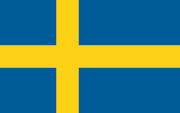
 |
|
|
|
|
United Kingdom MEPs 2004–2009 |
|
|
East Midlands
|
Derek Clark · Chris Heaton-Harris · Roger Helmer · Robert Kilroy-Silk · Bill Newton Dunn · Phillip Whitehead (replaced by Glenis Willmott)
|

 |
|
|
East of England
|
Christopher Beazley · Andrew Duff · Richard Howitt · Robert Sturdy · Jeffrey Titford · Geoffrey van Orden · Tom Wise
|
|
|
London
|
Gerard Batten · John Bowis · Robert Evans · Mary Honeyball · Jean Lambert · Sarah Ludford · Claude Moraes · Charles Tannock · Theresa Villiers (replaced by Syed Kamall)
|
|
|
North East England
|
Martin Callanan · Fiona Hall · Stephen Hughes
|
|
|
North West England
|
Robert Atkins · Chris Davies · Den Dover · Saj Karim · Arlene McCarthy · David Sumberg · Gary Titley · John Whittaker · Terry Wynn (replaced by Brian Simpson)
|
|
|
Northern Ireland
|
Jim Allister · Bairbre de Brún · Jim Nicholson
|
|
|
Scotland
|
Elspeth Attwooll · Ian Hudghton · David Martin · John Purvis · Alyn Smith · Struan Stevenson · Catherine Stihler
|
|
|
South East England
|
Richard Ashworth · Chris Huhne (replaced by Sharon Bowles) · Nirj Deva · James Elles · Nigel Farage · Daniel Hannan · Caroline Lucas · Ashley Mote · Emma Nicholson · Peter Skinner |
|
|
South West England
|
Giles Chichester · Trevor Colman · Glyn Ford · Caroline Jackson · Roger Knapman · Neil Parish · Graham Watson
|
|
|
Wales
|
Jillian Evans · Jonathan Evans · Glenys Kinnock · Eluned Morgan
|
|
|
West Midlands
|
Philip Bradbourn · Philip Bushill-Matthews · Michael Cashman · Neena Gill · Malcolm Harbour · Liz Lynne · Mike Nattrass
|
|
|
Yorkshire & the Humber
|
Godfrey Bloom · Richard Corbett · Timothy Kirkhope · Linda McAvan · Edward McMillan-Scott · Diana Wallis
|
|
|
|
|
|
| Category · European Union |
|
|
previous ← Members of the European Parliament 2009–2014 |
|
|
Austria MEPs 2009–2014 |
|
|
Martin Ehrenhauser · Karin Kadenbach · Othmar Karas · Elisabeth Köstinger · Jörg Leichtfried · Evelin Lichtenberger · Ulrike Lunacek · Hans-Peter Martin ·
Andreas Mölzer · Franz Obermayr · Hella Ranner · Evelyn Regner · Paul Rübig · Robert Sabitzer · Richard Seeber · Ernst Strasser · Johannes Swoboda
|

 |
|
|
|
|
Belgium MEPs 2009–2014 |
|
|
Dutch electoral college
|
Ivo Belet · Frieda Brepoels (replacing Bart De Wever) · Philip Claeys (replacing Filip Dewinter) · Jean-Luc Dehaene · Saïd El Khadraoui · Derk Jan Eppink (replacing Jean-Marie Dedecker) · Annemie Neyts-Uyttebroeck · Bart Staes · Dirk Sterckx · Marianne Thyssen · Kathleen Van Brempt · Frank Vanhecke · Guy Verhofstadt |

 |
|
|
French electoral college
|
Frédéric Daerden · Véronique De Keyser · Anne Delvaux · Isabelle Durant · Philippe Lamberts · Marc Tarabella (replacing Jean-Claude Marcourt) · Louis Michel · Frédérique Ries
|
|
|
German electoral college
|
Mathieu Grosch
|
|
|
|
|
Bulgaria MEPs 2009–2014 |
|
|
Slavcho Binev · Filiz Husmenova · Stanimir Ilchev · Iliana Ivanova · Rumiana Jeleva · Ivaylo Kalfin · Metin Kazak · Evgeni Kirilov · Nadezhda Mihaylova ·
Maria Nedeltcheva · Vladko Panayotov · Antonia Parvanova · Dimitar Stoyanov · Emil Stoyanov · Vladimir Urutchev · Kristian Vigenin · Iliana Yotova
|

 |
|
|
|
|
Cyprus MEPs 2009–2014 |
|
|
Takis Hadjigeorgiou · Ioannis Kasoulidis · Kyriacos Mavronicholas · Antigoni Papadopoulou · Eleni Theocharous · Kyriacos Triantaphyllides
|

 |
|
|
|
|
Czech Republic MEPs 2009–2014 |
|
|
Jan Březina · Zuzana Brzobohatá · Milan Cabrnoch · Andrea Češková · Robert Dušek · Richard Falbr · Hynek Fajmon · Jiří Havel · Jaromír Kohlíček · Edvard Kožušník · Jiří Maštálka ·
Miroslav Ouzký · Pavel Poc · Miloslav Ransdorf · Vladimir Remek · Zuzana Roithová · Libor Rouček · Olga Sehnalová · Ivo Strejček · Evžen Tošenovský · Oldřich Vlasák · Jan Zahradil
|

 |
|
|
|
|
Denmark MEPs 2009–2014 |
|
|
Margrete Auken · Bendt Bendtsen · Ole Christensen · Anne Elisabet Jensen · Dan Jørgensen · Morten Løkkegaard · Morten Messerschmidt ·
Jens Rohde · Anna Rosbach Andersen · Christel Schaldemose · Søren Søndergaard · Britta Thomsen · Emilie Turunen
|

 |
|
|
|
|
Estonia MEPs 2009–2014 |
|
|
Tunne Kelam · Kristiina Ojuland · Siiri Oviir · Ivari Padar · Vilja Savisaar · Indrek Tarand
|

 |
|
|
|
|
Finland MEPs 2009–2014 |
|
|
Sari Essayah · Carl Haglund · Satu Hassi · Heidi Hautala · Ville Itälä · Liisa Jaakonsaari · Anneli Jäätteenmäki ·
Eija-Riitta Korhola · Riikka Manner · Sirpa Pietikäinen · Mitro Repo · Timo Soini · Hannu Takkula
|

 |
|
|
|
|
France MEPs 2009–2014 |
|
|
East France
|
Joseph Daul · Véronique Mathieu · Arnaud Danjean · Michèle Striffler · Catherine Trautmann · Liêm Hoang-Ngoc · Sandrine Bélier · Nathalie Griesbeck · Bruno Gollnisch
|

 |
|
|
Île-de-France
|
Michel Barnier · Rachida Dati · Jean-Marie Cavada · Marielle Gallo · Philippe Juvin · Daniel Cohn-Bendit · Eva Joly · Pascal Canfin · Karima Delli · Harlem Désir · Pervenche Berès · Marielle de Sarnez · Patrick Le Hyaric |
|
|
Massif Central-Centre
|
Jean-Pierre Audy · Sophie Briard-Auconie · Catherine Soullie · Henri Weber · Jean-Paul Besset
|
|
|
North-West France
|
Dominique Riquet · Tokia Saïfi · Jean-Paul Gauzès · Pascale Gruny · Gilles Pargneaux · Estelle Grelier · Hélène Flautre · Marine Le Pen · Corinne Lepage · Jacky Hénin
|
|
|
Overseas Territories
|
Maurice Ponga · Élie Hoarau · Patrice Tirolien
|
|
|
South-East France
|
Françoise Grossetête · Damien Abad · Dominique Vlasto · Gaston Franco · Michel Dantin · Michèle Rivasi · François Alfonsi · Malika Benarab-Attou · Vincent Peillon · Sylvie Guillaume · Jean-Marie Le Pen · Jean-Luc Bennahmias · Marie-Christine Vergiat |
|
|
South-West France
|
Dominique Baudis · Christine de Veyrac · Alain Lamassoure · Marie-Thérèse Sanchez-Schmid · Kader Arif · Françoise Castex · José Bové · Catherine Grèze · Robert Rochefort · Jean-Luc Mélenchon |
|
|
West France
|
Christophe Béchu · Élisabeth Morin · Alain Cadec · Bernadette Vergnaud · Stéphane Le Foll · Yannick Jadot · Nicole Kiil-Nielsen · Philippe de Villiers · Sylvie Goulard
|
|
|
|
|
Germany MEPs 2009–2014 |
|
Jan Philipp Albrecht · Alexander Alvaro · Burkhard Balz · Lothar Bisky · Reimer Böge · Franziska Brantner · Elmar Brok · Udo Bullmann · Reinhard Bütikofer · Daniel Caspary · Jorgo Chatzimarkakis · Michael Cramer · Jürgen Creutzmann · Albert Deß · Christian Ehler · Ismail Ertug · Cornelia Ernst · Markus Ferber · Knut Fleckenstein · Karl-Heinz Florenz · Michael Gahler · Evelyne Gebhardt · Jens Geier · Sven Giegold · Norbert Glante · Ingeborg Gräßle · Matthias Groote · Gerald Häfner · Thomas Händel · Rebecca Harms · Martin Häusling · Jutta Haug · Nadja Hirsch · Monika Hohlmeier · Peter Jahr · Elisabeth Jeggle · Petra Kammerevert · Martin Kastler · Franziska Keller · Christa Klaß · Wolf Klinz · Jürgen Klute · Dieter-Lebrecht Koch · Silvana Koch-Mehrin · Holger Krahmer · Constanze Krehl · Wolfgang Kreissl-Dörfler · Werner Kuhn · Alexander Graf Lambsdorff · Bernd Lange · Werner Langen · Kurt Lechner · Klaus-Heiner Lehne · Josef Leinen · Hans-Peter Liese · Barbara Lochbihler · Sabine Lösing · Thomas Mann · Hans-Peter Mayer · Gesine Meißner · Norbert Neuser · Angelika Niebler · Doris Pack · Markus Pieper · Bernd Posselt · Hans-Gert Pöttering · Godelieve Quisthoudt-Rowohl · Bernhard Rapkay · Britta Reimers · Herbert Reul · Ulrike Rodust · Dagmar Roth-Behrendt · Heide Rühle · Horst Schnellhardt · Birgit Schnieber-Jastram · Helmut Scholz · Elisabeth Schroedter · Martin Schulz · Werner Schulz · Andreas Schwab · Peter Simon · Birgit Sippel · Renate Sommer · Jutta Steinruck · Alexandra Thein · Michael Theurer · Helga Trüpel · Thomas Ulmer · Sabine Verheyen · Axel Voss · Manfred Weber · Barbara Weiler · Anja Weisgerber · Kerstin Westphal · Rainer Wieland · Sabine Wils · Hermann Winkler · Joachim Zeller · Gabriele Zimmer |

 |
|
|
|
|
Greece MEPs 2009–2014 |
|
|
Kriton Arsenis · Nikolaos Chountis · Marilena Koppa · Giorgos Koumoutsakos · Rodi Kratsa-Tsagaropoulou · Stavros Lambrinidis · Thanasis Pafilis · Chrysoula Paliadeli · Giorgos Papakonstantinou · Giorgos Papanikolaou · Georgios Papastamkos · Thanos Plevris · Anni Podimata · Konstantinos Poupakis · Sylvana Rapti · Theodoros Skylakakis · Giorgos Stavrakakis · Giorgos Toussas · Michalis Tremopoulos · Ioannis Tsoukalas · Niki Tzavela · Marietta Giannakou
|

 |
|
|
|
|
Hungary MEPs 2009–2014 |
|
|
János Áder · Zoltán Balczó ·Lajos Bokros · Tamás Deutsch · Kinga Gál · Béla Glattfelder · Kinga Göncz · Zita Gurmai · Enikő Győri · András Gyürk · Ágnes Hankiss · Edit Herczog · Lívia Járóka · Ádám Kósa · Béla Kovács · Krisztina Morvai · Csaba Őry · Pál Schmitt · György Schöpflin · László Surján · József Szájer · Csanád Szegedi · Csaba Tabajdi
|

 |
|
|
|
|
Ireland MEPs 2009–2014 |
|
|
Dublin
|
Proinsias De Rossa · Joe Higgins · Gay Mitchell
|

 |
|
|
East
|
Liam Aylward · Nessa Childers · Mairead McGuinness
|
|
|
North-West
|
Pat "the Cope" Gallagher · Marian Harkin · Jim Higgins
|
|
|
South
|
Brian Crowley · Alan Kelly · Seán Kelly
|
|
|
|
|
Italy MEPs 2009–2014 |
|
|
Central
|
Roberta Angelilli · Alfredo Antoniozzi · Paolo Bartolozzi · Carlo Casini · Silvia Costa · Leonardo Domenici · Roberto Gualtieri · Guido Milana · Francesco De Angelis · Claudio Morganti · Alfredo Pallone · Niccolò Rinaldi · Potito Salatto · David Sassoli · Marco Scurria
|

 |
|
|
Islands
|
Rita Borsellino · Rosario Crocetta · Salvatore Iacolino · Giovanni La Via · Saverio Romano · Giommaria Uggias
|
|
|
North East
|
Sergio Berlato · Luigi Berlinguer · Mara Bizzotto · Antonio Cancian · Salvatore Caronna · Giovanni Collino · Luigi De Magistris · Herbert Dorfmann · Lorenzo Fontana · Elisabetta Gardini · Tiziano Motti · Vittorio Prodi · Amalia Sartori · Giancarlo Scottà · Debora Serracchiani
|
|
|
North West
|
Gabriele Albertini · Sonia Alfano · Magdi Allam · Francesca Balzani · Vito Bonsignore · Mario Borghezio · Sergio Cofferati · Lara Comi · Carlo Fidanza · Mario Mauro · Cristiana Muscardini · Pier Antonio Panzeri · Fiorello Provera · Licia Ronzulli · Oreste Rossi · Francesco Speroni · Gianluca Susta · Patrizia Toia · Gianni Vattimo · Sonia Viale · Iva Zanicchi |
|
|
Southern
|
Pino Arlacchi · Raffaele Baldassarre · Andrea Cozzolino · Paolo De Castro · Vincenzo Iovine · Clemente Mastella · Barbara Matera · Erminia Mazzoni · Ciriaco De Mita · Aldo Patriciello · Mario Pirillo · Gianni Pittella · Crescenzio Rivellini · Sergio Silvestris · Salvatore Tatarella
|
|
|
|
|
Latvia MEPs 2009–2014 |
|
|
Ivars Godmanis · Sandra Kalniete · Arturs Krišjānis Kariņš · Aleksandrs Mirskis · Alfrēds Rubiks · Inese Vaidere · Tatjana Ždanoka · Roberts Zīle
|

 |
|
|
|
|
Lithuania MEPs 2009–2014 |
|
Laima Liucija Andrikienė · Zigmantas Balčytis · Vilija Blinkevičiūtė · Leonidas Donskis · Juozas Imbrasas · Vytautas Landsbergis ·
Radvilė Morkūnaitė · Rolandas Paksas · Justas Vincas Paleckis · Algirdas Saudargas · Valdemar Tomaševski · Viktor Uspaskich |

 |
|
|
|
|
Luxembourg MEPs 2009–2014 |
|
|
Georges Bach · Frank Engel · Robert Goebbels · Charles Goerens · Astrid Lulling · Claude Turmes
|

 |
|
|
|
|
Malta MEPs 2009–2014 |
|
|
John Attard Montalto · Simon Busuttil · David Casa · Joseph Cuschieri · Louis Grech · Edward Scicluna
|

 |
|
|
|
|
Netherlands MEPs 2009–2014 |
|
|
Hans van Baalen · Bas Belder · Thijs Berman · Louis Bontes · Emine Bozkurt · Wim van de Camp · Marije Cornelissen · Peter van Dalen · Bas Eickhout · Gerben-Jan Gerbrandy · Jeanine Hennis-Plasschaert · Dennis de Jong · Esther de Lange · Kartika Liotard · Barry Madlener · Toine Manders · Judith Merkies · Lambert van Nistelrooij · Ria Oomen-Ruijten · Judith Sargentini · Marietje Schaake · Laurence Stassen · Daniël van der Stoep · Sophie in 't Veld · Corien Wortmann-Kool
|

 |
|
|
|
|
Poland MEPs 2009–2014 |
|
Adam Bielan · Piotr Borys · Jerzy Buzek · Tadeusz Cymański · Ryszard Czarnecki · Lidia Geringer de Oedenberg · Adam Gierek · Marek Gróbarczyk · Andrzej Grzyb · Róża Gräfin Von Thun Und Hohenstein · Małgorzata Handzlik · Jolanta Hibner · Danuta Hubner · Danuta Jazłowiecka · Sidonia Jędrzejewska · Filip Kaczmarek · Jarosław Kalinowski · Michał Kamiński · Lena Kolarska-Bobińska · Paweł Kowal · Jacek Kurski · Ryszard Legutko · Janusz Lewandowski · Bogusław Liberadzki · Krzysztof Lisek · Elżbieta Łukacijewska · Bogdan Marcinkiewicz · Marek Migalski · Sławomir Nitras · Wojciech Olejniczak · Jan Olbrycht · Mirosław Piotrowski · Tomasz Poręba · Jacek Protasiewicz · Jacek Saryusz-Wolski · Joanna Senyszyn · Czesław Siekierski · Marek Siwiec · Joanna Skrzydlewska · Bogusław Sonik · Konrad Szymański · Rafał Trzaskowski · Jarosław Wałęsa · Jacek Włosowicz · Janusz Wojciechowski · Paweł Zalewski · Artur Zasada · Janusz Zemke · Zbigniew Ziobro · Tadeusz Zwiefka |

 |
|
|
|
|
Portugal MEPs 2009–2014 |
|
|
Luís Paulo Alves · Regina Bastos · Luís Capoulas Santos · Graça Carvalho · Maria do Céu Patrão · Carlos Coelho · António Correia de Campos · Mário David · Edite Estrela · Diogo Feio · José Manuel Fernandes · Elisa Ferreira · João Ferreira · Ilda Figueiredo · Ana Gomes · Marisa Matias · Nuno Melo · Vital Moreira · Miguel Portas · Paulo Rangel · Rui Tavares · Nuno Teixeira
|

 |
|
|
|
|
Romania MEPs 2009–2014 |
|
Elena Antonescu · Elena Băsescu · George Becali · Sebastian Bodu · Victor Boştinaru · Cristian Buşoi · Corina Creţu · Sabin Cutaş · Vasilica Dănciă · Ioan Enciu · Cătălin Ivan · Petru Luhan · Monica Macovei · Marian-Jean Marinescu · Ramona Mănescu · Iosif Matula · Norica Nicolai · Rareş Niculescu · Ioan Mircea Paşcu · Rovana Plumb · Cristian Preda · Daciana Octavia Sârbu · Adrian Severin · Theodor Stolojan · Csaba Sogor · László Tőkés · Claudiu Ciprian Tănăsescu · Silvia Adriana Ţicău · Traian Ungureanu · Corneliu Vadim-Tudor · Adina Ioana Vălean · Renate Weber · Iuliu Winkler |

 |
|
|
|
|
Slovakia MEPs 2009–2014 |
|
|
Edit Bauer · Monika Beňová · Sergej Kozlík · Eduard Kukan · Vladimír Maňka · Alajos Mészáros · Miroslav Mikolášik ·
Katarína Neveďalová · Jaroslav Paška · Monika Smolková · Peter Šťastný · Boris Zala · Anna Záborská
|

 |
|
|
|
|
Slovenia MEPs 2009–2014 |
|
|
Romana Jordan Cizelj · Tanja Fajon · Jelko Kacin · Lojze Peterle · Zoran Thaler · Ivo Vajgl · Milan Zver
|

 |
|
|
|
|
Spain MEPs 2009–2014 |
|
|
Magdalena Álvarez Arza · Josefa Andrés Barea · Pablo Arias Echeverría · Inés Ayala Sender · Pilar Ayuso González · María Badia i Cutchet · Izaskun Bilbao · Alejandro Cercas Alonso · Ricardo Cortes Lastra · Luis de Grandes Pascual · María Pilar del Castillo Vera · Agustín Díaz de Mera García-Consuegra · Rosa Estaràs Ferragut · Santiago Fisas Ayxelá · Carmen Fraga Estévez · Iratxe García Pérez · José Manuel García-Margallo Marfil · Eider Gardiazabal Rubial · Garriga Polledo · Enrique Guerrero Salom · Cristina Gutiérrez-Cortines Corral · María Esther Herranz García · Carlos Iturgaiz Angulo · Ramón Jáuregui Atondo · Teresa Jiménez-Becerril Barrio · Oriol Junqueras · Verónica Lope Fontagne · Juan Fernando López Aguilar · Antonio López-Istúriz White · Miguel Ángel Martínez Martínez · Antonio Masip Hidalgo · Gabriel Mato Adrover · Jaime Mayor Oreja · Francisco Millán Mon · Íñigo Méndez de Vigo Montojo · Emilio Menéndez del Valle · Willy Meyer · María Muñiz de Urquiza · Raimon Obiols i Germà · Juan Andrés Perelló Rodríguez · Teresa Riera Madurell · Carmen Romero López · Raül Romeva · José Ignacio Salafranca Sánchez-Neyra · Antolín Sánchez Presedo · Francisco Sosa Wagner · Ramon Tremosa · Alejo Vidal-Quadras Roca · Luis Yáñez Barnuevo · Pablo Zalba Bidegain
|

 |
|
|
|
|
Sweden MEPs 2009–2014 |
|
|
Anna Maria Corazza Bildt · Lena Ek · Christian Engström · Christofer Fjellner · Göran Färm · Anna Hedh · Gunnar Hökmark · Anna Ibrisagic · Olle Ludvigsson ·
Isabella Lövin · Marit Paulsen · Carl Schlyter · Olle Schmidt · Alf Svensson · Eva-Britt Svensson · Marita Ulvskog · Åsa Westlund · Cecilia Wikström
|

 |
|
|
|
|
United Kingdom MEPs 2009–2014 |
|
|
East Midlands
|
Derek Clark · Roger Helmer · Emma McClarkin · Bill Newton Dunn · Glenis Willmott
|

 |
|
|
East of England
|
Stuart Agnew · David Campbell Bannerman · Andrew Duff · Vicky Ford · Richard Howitt · Robert Sturdy · Geoffrey Van Orden
|
|
|
London
|
Gerard Batten · Mary Honeyball · Syed Kamall · Jean Lambert · Sarah Ludford · Claude Moraes · Charles Tannock · Marina Yannakoudakis
|
|
|
North East England
|
Martin Callanan · Fiona Hall · Stephen Hughes
|
|
|
North West England
|
Sir Robert Atkins · Jacqueline Foster · Sajjad Karim · Paul Nuttall · Chris Davies · Nick Griffin · Arlene McCarthy · Brian Simpson |
|
|
Northern Ireland
|
Bairbre de Brún · Diane Dodds · Jim Nicholson
|
|
|
Scotland
|
Ian Hudghton · George Lyon · David Martin · Alyn Smith · Struan Stevenson · Catherine Stihler
|
|
|
South East England
|
Marta Andreasen · Richard Ashworth · Catherine Bearder · Sharon Bowles · Nirj Deva · James Elles · Nigel Farage · Daniel Hannan · Keith Taylor (replacing Caroline Lucas) · Peter Skinner |
|
|
South West England
|
Giles Chichester · Trevor Colman · Ashley Fox · Julie Girling · William Dartmouth · Graham Watson
|
|
|
Wales
|
John Bufton · Jillian Evans · Kay Swinburne · Derek Vaughan
|
|
|
West Midlands
|
Philip Bradbourn · Michael Cashman · Malcolm Harbour · Liz Lynne · Mike Nattrass · Nikki Sinclaire
|
|
|
Yorkshire & the Humber
|
Godfrey Bloom · Andrew Brons · Timothy Kirkhope · Linda McAvan · Edward McMillan-Scott · Diana Wallis
|
|
|
|
|
|
| Category · European Union |
|



